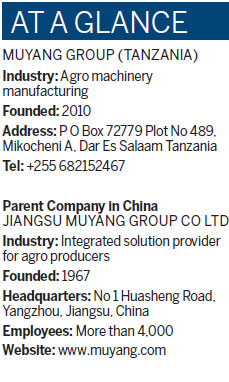Tanzania's main farmhand

Chinese farm machinery maker helping to modernize nation's agricultural industries
Four years ago, Guan Zhihua, CEO of a Chinese manufacturer of animal feed machinery, came to Tanzania to scout out new customers. Four years later, he only has six, though most of them are feed factories and livestock farms.
Agriculture may be the backbone of the Tanzanian economy, but Guan says there is little resembling modernization in its farming industries.
Still, the regional sales manager of Jiangsu Muyang Group Co Ltd says there is a lot of potential for a nation where manual farming is the norm but is slowly transitioning into modern farming machinery.
As Tanzania makes its transition, Guan says, Jiangsu Muyang Group, one of the leading feed machinery manufacturers in China and in Asia, sees opportunities to not only provide its machinery but also offer after-sales services and solutions.
He says the company helps customers install its machinery, gives maintenance advice and provides customer-friendly payment plans.
"We not only help them give birth to their children but also help them raise their babies," Guan quips about their customer service.
Jiangsu Muyang Group was founded in 1967, is active in over 80 countries and has more than 2,500 employees. It also has more than 40 representatives in about 50 countries.
In 2010, Muyang began opening regional sales offices and service centers to better support its customers. Guan says he is working to establish one in Tanzania - it has an office in Kenya - because many international feed producers such as Thailand's Chia Tai Group are eyeing the African country's promising market. The largest feed manufacturer in the world, Chia Tai has a feed factory in Tanzania, which provides a great opportunity for Jiangsu Muyang Group, he says.
Though Muyang is not the sole machinery provider in Tanzania and faces fierce competition from Western competitors, it has cemented a reputation as a reliable machinery provider through its sales network in Africa that includes Kenya, Ethiopia, Morocco, Algeria, Tunisia and South Africa. Guan says with machinery prices and level of quality key factors in African markets, products made in China had a reputation for being inferior.

But as Chinese companies have raised their brand awareness and improved their product quality in recent years, more and more African customers are recognizing and accepting products from China. He adds that the cost performance ratios of machinery made in China, compared with products from Western countries, are much higher.
In addition to selling machinery, Muyang also provides grain storage services. Guan says official statistics show that 20-30 percent of grain in Tanzania is being wasted because of improper methods of storage, though the Tanzanian government recently began constructing 30 new silos to help address the growing need of storing the surplus of Tanzania's grain harvests. The project is expected to cost $50 million.
Christopher Chiza, the Tanzania minister for agriculture, food security and cooperatives, says the national government not only plans to construct new silos, but will also invest in repairing existing granaries.
Speaking at the ministry's recent budget proposals in Parliament, Chiza said there is an excess of maize and rice in Tanzania that is not receiving adequate storage. He added that these initial projections are expected to increase.
"Last year, the country registered an average food sufficiency level of 118 percent," he said.
Chiza said the grain surplus could be even greater because many of the country's farmers are reaching out to ask for additional storage silos to accommodate their bumper maize crops.
The project provides huge opportunity for Muyang, which has been working to help Tanzanian farmers store their grain for several years. Traditionally, Tanzanian farmers store their grain in large, expensive but poorly built warehouses, where ventilation conditions and protective measures are poor. This has led to a large proportion of grain stored in warehouses being wasted.
But Guan says silos built by Muyang have their own central control rooms that can monitor and modify temperature and humidity. The company's silos provide better ventilation than those built by Tanzanian farmers, which allows for longer storage periods in a comparatively consistent temperature.
Jiangsu Muyang's customers in Tanzania include ports, government facilities, feed processing companies, breweries and flour producers.
Over the past three decades, Chinese support in Africa has been rising steadily. Trade between China and Africa rose by 700 percent in the 1990s. China's foreign direct investment in Africa has increased by over 50 percent per year since 2001.
Aside from the highly visible presence of China's state-owned enterprises that take on massive projects, private firms such as Jiangsu Muyang have been carving out their own commercial projects as well.
liuhongjie@chinadaily.com.cn


| A Tanzanian customer operates a feed machine purchased from Jiangsu Muyang Group. Provided to China Daily |
(China Daily Africa Weekly 11/07/2014 page23)
Today's Top News
- Mainland denounces Taiwan-US trade deal as 'sellout pact'
- Steering Sino-US relations in the right direction
- Retired judges lend skills to 'silver-haired mediation'
- Are you ready for robots to roam your streets?
- Good start for new five-year plan stressed
- Nation calls for cooperation and free trade































